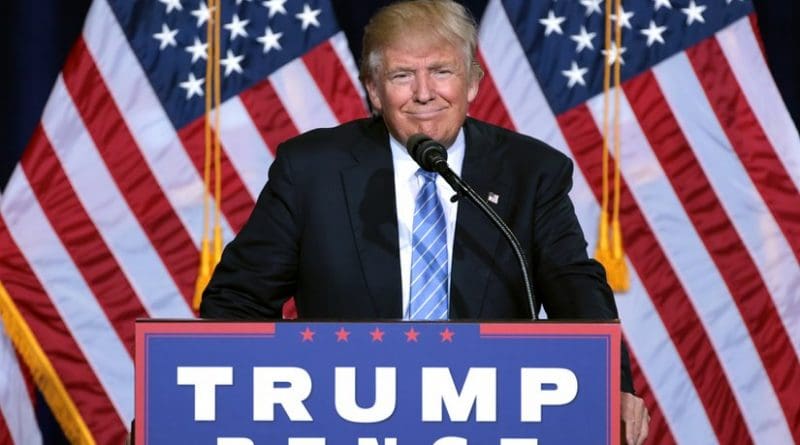Rise Of Trump And Global Implications: Future Of International Monetary And Financial System – Analysis
By RSIS
With Trump as the next American president, how will this affect the future of the international financial system? The prospect of future governance looks grim due to the lack of enforcement and leadership at the global level.
By Kaewkamol Pitakdumrongkit*
Now that Donald Trump has won the United States presidential election and will become the 45th American President, questions abound about the future of the international financial system. In the immediate term his victory will lead to sell-offs and stock market instability. Even before his confirmed victory, the markets around the world had reacted negatively. For example, S&P 500 futures plummeted by 4 per cent and the Nikkei Index plunged by 5 percent.
Stock markets would continue to be volatile amidst the uncertainties about economic policies under the Trump administration. It is largely unknown what his economic team will consist of and who exactly would design the policies.
Risks of Competitive Devaluation and Currency Wars
Unlike trade matters which repeatedly showed up in his campaign rhetoric, the issues of international money and finance was hardly mentioned. Yet, much of the uncertainties and unknowns loom large in this area. Going forward, how would his presidency shape the future of the global monetary and financial system? In terms of governance, what would be its impacts on international monetary and financial cooperation?
The consequences are likely to stem from the trade policies the Trump administration would pursue. During his campaign, he pledged to undertake trade protectionism against several countries to protect American jobs and interests by increasing tariffs on products from certain states.
Intensifying American protectionism would worsen the world’s economy further. Such action would exacerbate the global trend towards protectionism which could spill over onto the international financial and monetary order. The combination of global sluggish demand and growing US protectionism would concoct a perfect recipe for exchange-rates manipulation.
Under such condition, several states would feel more tempted to tinker with exchange rates to boost trade competitiveness and gain an edge in the world’s markets. Such manipulation could lead to competitive devaluation. Currency wars could thus result, ruining the global trade, financial, and investment flows.
Can the World be Saved?
Risks of competitive devaluation and currency wars beget a bigger issue of governance. For any system to maintain and function smoothly, governance is required. The stakeholders must cooperate with one another on deciding the set of rules which they will abide by. In the Westphalian system, cooperation rarely occurs spontaneously. To achieve collaboration, nation-states need to work together on two main things: making rules and enforcing them.
What is daunting is not the fact that the world lacks rules governing currency manipulation, but the fact that the power to enforce such principles on sovereign nations is limited. There have been efforts by international organisations to tackle competitive devaluation at the global level. For example, Article IV of the International Monetary Fund (IMF) Agreement contends that each member shall “avoid manipulating exchange rates or the international monetary system in order to prevent effective balance of payments adjustment or to gain an unfair competitive advantage over other members”.
Likewise, the Group of Twenty (G-20) attempted to address the issue. According to the Communique coined at the Hangzhou Summit in September 2016, the leaders pledged to confirm their “previous exchange rate commitments, including . . . [refraining] from competitive devaluations and . . . [using] . . . exchange rates for competitive purposes”.
Would US Lead Again?
As stated earlier, governance cannot be accomplished without the agreed rules being adopted or implemented. Unfortunately, the enforcement power of the IMF and G-20 is limited. The Fund’s power to prevent states from adjusting their exchange rates for trade gains is questionable. Admittedly, the Organisation’s influence tends to stem from the conditionalities it imposes upon its borrowers.
But if countries do not have borrowing ties with the Fund, it does not have the authority to force states to implement the policies it prefers. As for the G-20, its cooperation is largely on a voluntary basis and formal enforcement mechanisms are absent. This bloc is at best endowed with the power to persuade, which is different from enforcement.
Who could fill such enforcement void? Enforcement can occur when a particular nation assumes leadership. Leadership happens when one state coerces or cajoles other countries to adopt and implement the agreed rules and principles. History has taught us so. The US leadership largely contributed to the successful construction of the Bretton Woods System after World War II.
Would the Americans take up this role again? It is difficult or even almost impossible to see Washington take a lead in managing international money and finance when the new administration seems to turn its back on the open system.
What would the future look like for global money and finance? It is not hopeful. The world is likely to experience more market volatilities and the hanging risks of currency manipulation, competitive devaluation, and possible currency wars. Couple these with the absence of enforcement mechanisms and leadership at the global stage, the world will just have to brace itself for the impact.
*Kaewkamol Pitakdumrongkit is an Assistant Professor at the Centre for Multilateralism Studies, at S. Rajaratnam School of International Studies (RSIS) of Nanyang Technological University, Singapore.

